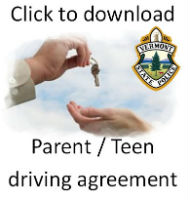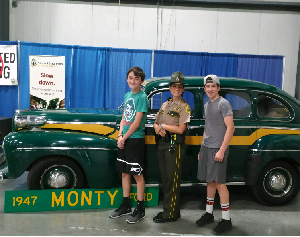 Young drivers, ages 15 to 20 years old, are especially vulnerable to death and injury on our roadways. Traffic crashes are the leading cause of death for teenagers in America. Mile for mile, teenagers are involved in three times as many fatal crashes as all other drivers.
Young drivers, ages 15 to 20 years old, are especially vulnerable to death and injury on our roadways. Traffic crashes are the leading cause of death for teenagers in America. Mile for mile, teenagers are involved in three times as many fatal crashes as all other drivers.
Inexperience and immaturity combined with speed, impaired driving, not wearing seat belts, distracted driving (cellphone use, loud music, other teen passengers, etc.), drowsy driving, and nighttime driving all aggravate this problem.
Download a Parent / Teen driving agreement
The agreement linked above was developed by the Vermont State Police and is freely available for parents and teens to use as a starting point to discuss the rules and responsibilities of driving a vehicle.
 Teen Driving Safety Tips from Consumer Affairs:
Teen Driving Safety Tips from Consumer Affairs:
1. Give them as much experience as possible
As parents, there are many ways we enjoy spending time with our children. Spending dozens, if not hundreds, of hours sitting white-knuckled in the passenger seat while your student driver practices merging onto a major highway isn’t even on the list. Trust us, we understand.
But according to the National Center for Biotechnology Information, newly licensed drivers are about eight times more likely to be involved in fatal crashes in their first six months than more experienced drivers. The takeaway? Experience counts. The Center for Disease Control suggests that increased education programs and parental involvement in instruction are associated with reductions of as many as 40% of fatal and injury crashes among 16-year-olds.
2. And, make sure part of that experience is in bad conditions
Most people (and even some dogs), are pretty excellent drivers with nothing but sunshine and open roads. Inclement weather causes more than 1.5 million reported traffic accidents per year, resulting in 673,000 injuries and 7,400 fatalities.
"Before they take their driver’s test, make sure your student drivers have experience in all different types of weather and non-weather conditions,” says Monica Savioz of Edward Savioz DTS Inc. “That includes everything from heavy traffic to rain, ice, snow and extreme heat."
3. Get them professional instruction
Although we’re sure that you’re probably an excellent driver (you would never speed or cut someone off, would you?), and an even better parent, how are you as a teacher? Many driving school instructors have been teaching student drivers for decades, and we all know teenagers are more likely to listen to literally anyone else than take instruction from8 their parents.
"Take a six hour behind-the-wheel course,” says Dave Urbanek of Urbanek’s Driving School. “The skills provided for young drivers will, hopefully, stay with them all of their lives. We still have former students that we come across that say they are always using tidbits of their driver's education in their everyday driving experiences."
4. Teach by doing
We don't have to tell you that teens are impressionable; first Rihanna and Ellie Goulding, now every teenage girl has half of her head shaved. While you can't control which fashion trends they embrace, you can influence the way they drive.
"Teens are very likely to pick up the habits of their parents,” says J.C. Fawcett of the Defensive Driving School. “A parent should think about. Do I cuss at other drivers while driving? Do I speed? Do I tailgate? The training that comes from students observing their parents is very powerful. If a parent attempts to change their habits only when their teen is learning to drive, it's probably 10 years too late."
5. Relax and enjoy the moment
Teaching someone to drive can be a stressful experience for both student and teacher. When your life flashes in front of you every few minutes, it can be hard to keep your cool. But even though all of your instincts may tell you to raise your voice and grab the wheel, try to relax.
"Take this time as an opportunity to learn from one another,” says Monica Savioz of Edward Savioz DTS Inc. “Parents and teens should show restraint and try to restrain from screaming at each other."
Think of it this way, when else are you going to have your teen in a position where it’s actually against the law for them to ignore you in favor of their smart phone?
Start your engines!
Watching your teenage driver get behind the wheel for the first time can be nerve-wracking. But with the proper instruction and lots of practice, they’ll be able to safely navigate the road for decades to come.

